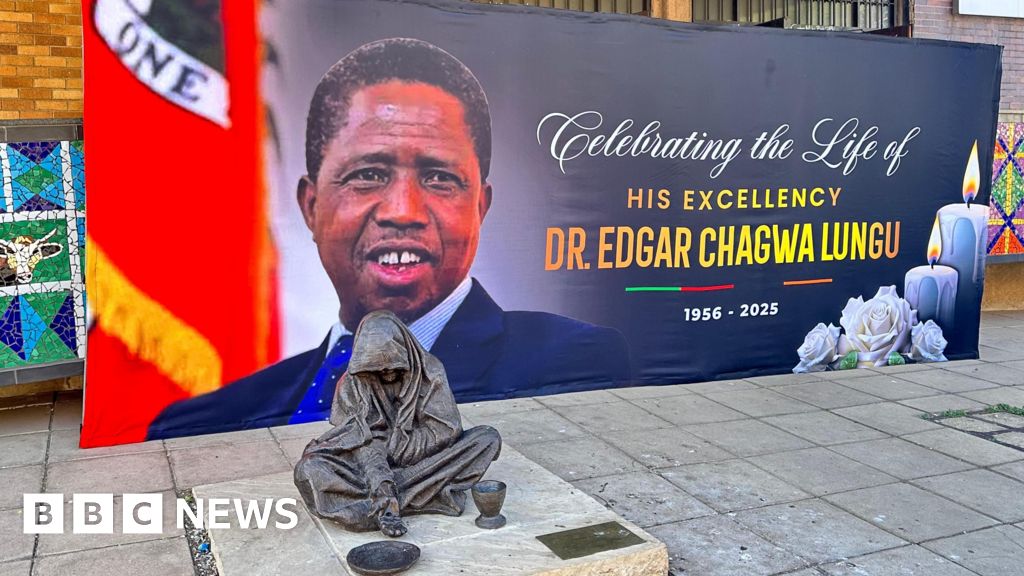Burial of Zambia's ex-president in South Africa halted at last minute by court

South African Court Halts Burial of Zambia's Former President Lungu Amid Family-Government Dispute
A South African court has abruptly halted the planned private burial of former Zambian President Edgar Lungu in South Africa, throwing funeral arrangements into disarray. The decision, announced to mourners after a funeral mass in Johannesburg, is the latest development in a contentious dispute between Lungu's family and the Zambian government over where he should be laid to rest.
The Zambian government filed an urgent application in the Pretoria High Court seeking to prevent the burial, arguing that Lungu, as a former head of state, should be interred in Zambia with full state honours. The court has postponed any funeral proceedings until at least August, pending further legal submissions.
Family Opts for Private Burial Amidst Feud
The dispute stems from a long-standing animosity between Lungu and his successor, current Zambian President Hakainde Hichilema. Lungu's family claims that he had expressed wishes that Hichilema not attend his funeral, leading them to seek a private burial in South Africa, away from what they perceived as potential political interference.
Following Lungu's death at the age of 68 in South Africa, his family initially sought to manage all funeral arrangements, including the repatriation of his body. However, the Zambian government insisted on a state funeral, leading to disagreements over the specifics and ultimately prompting the family's decision to bury him in South Africa.
Government Argues for National Interest
President Hichilema has asserted that Lungu "belongs to the nation of Zambia" and deserves to be buried within its borders, emphasizing the importance of honouring former leaders. This argument echoes a similar situation in 2021 following the death of Zambia's founding President, Kenneth Kaunda.
In Kaunda's case, his family expressed a desire for him to be buried next to his wife, rather than at a government-designated site. However, the government proceeded with a state burial at Embassy Memorial Park in Lusaka, citing the overriding national interest. The Lungu case is bringing these issues to the forefront again.
Legal Proceedings and Future Hearings
The Pretoria court has instructed Zambian Attorney General Mulilo D Kabesha to submit an "amended notice of motion" by July 4th, supporting the repatriation of Lungu's body to Zambia. Lungu's family has until July 11th to file their opposing arguments. A full hearing on the matter is scheduled for August 4th, 2025, with the court also set to determine who will bear the costs of the urgent application.
Expert Perspective: Precedent and Political Implications
"This situation highlights the complex interplay between personal wishes, family autonomy, and the state's prerogative in honouring former leaders," says Dr. Neo Simutanyi, a Zambian political analyst based at the University of Lusaka. "The government likely fears that allowing a private burial outside Zambia could set a precedent, potentially undermining its authority and the symbolic importance of state funerals."
Dr. Simutanyi adds that the dispute also reflects the ongoing political tensions in Zambia. "The relationship between Lungu and Hichilema has been fraught with difficulties, and this funeral controversy is an unfortunate extension of that. It underscores the need for more inclusive and respectful dialogue between political actors, even in times of grief."
Historical Context: Burial Disputes and African Leadership
Disputes over the burial of former African leaders are not uncommon. Similar controversies have arisen in the past, including the cases of Angola's José Eduardo dos Santos and Zimbabwe's Robert Mugabe. These instances often involve disagreements between families and governments regarding funeral arrangements, the location of burial, and the level of state involvement.
José Eduardo dos Santos (Angola): A protracted legal battle ensued between his family and the Angolan government over the repatriation of his body from Spain. Robert Mugabe (Zimbabwe): His family resisted government attempts to bury him at the National Heroes Acre, ultimately opting for a private burial in his rural home.
These cases illustrate the sensitive nature of these situations and the potential for political and familial tensions to escalate during times of mourning.
Lingering Tensions: A Legacy of Discord
The feud between Lungu and Hichilema dates back several years. While Lungu was president, Hichilema was imprisoned for over 100 days on treason charges after his motorcade allegedly failed to yield to Lungu's. This incident remains a point of contention and symbolizes the deep divisions within Zambian politics.
The current impasse over Lungu's burial underscores the challenges of navigating these divisions, even in death. The outcome of the court proceedings will have significant implications for the future of Zambian politics and the way the nation honours its former leaders.
Originally sourced from: BBC News Africa
